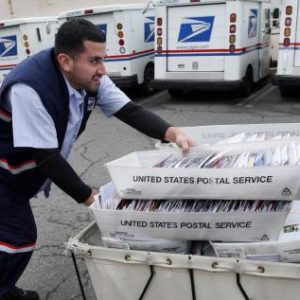Editor’s Note: For another viewpoint, see Point: Postal Bailout Talk Shows Washington’s Fiscal Insanity
As a public service, the U.S. Postal Service has provided a significant boost to the nation’s prosperity and well-being. A strong postal service is essential under the current threats of a pandemic and an economic recession.
The USPS is in financial trouble for no reason other than Congress decreed that it should be so. The president’s role has been to install a postmaster-general, one Louis DeJoy, to administer the coup de grâce.
In 2006, Congress enacted the Postal Accountability and Enhancement Act, requiring the service to pre-fund its employee pensions and retirement health care insurance with revenues from stamps and the like, unlike most other federal government agencies. The result is operating deficits that give DeJoy an excuse to cut services. Such cuts will further reduce revenues, giving rise to further deficits. Rinse and repeat.
The postal workers’ unions are asking for a $25 billion share of the disputed COVID-19 relief package. A bipartisan agreement for $900 billion has been struck and could be passed quickly if the Republican Senate Majority Leader Mitch McConnell permitted a vote to be taken.
At present, the USPS has already been granted $10 billion in new borrowing authority. That is certainly better than zero, but it is well short of adequate. It doesn’t take advanced math to see that within the large federal budget, maintaining mail delivery is a relatively minor task in the grand scheme of things. Relief measures in the trillions for other purposes have been discussed and may see the light of day when Joe Biden takes office next month.
The problem is not just financial. It is also managerial. DeJoy has shown a determination to whittle down the service. He has failed to use the $10 billion already provided. Without the hurricane of protest, he might have succeeded in sabotaging vote-by-mail. He has to go. He might be better off leaving on his own, the better to prepare for potential prosecution for campaign finance crimes.
The USPS is an under-appreciated public asset. The pandemic makes it more so. The more than 30,000 postal retail facilities could assist in vaccine distribution and other relief functions. We are seeing lines of hundreds of vehicles at food banks. The sooner universal vaccination is accomplished, the sooner the economy can be turned back up to maximum capacity.
Economically, a supplement to USPS operating revenues is also opportune.
Additional public spending replaces lost private sector spending, helping to revive employment. In light of the depressed level of interest rates, now is also a good time to invest in USPS plants and equipment.
The privatization alternative pushed by DeJoy and the politicians seeking to limit USPS resources to the revenues that can be collected will mean further degradation of service, which has also been the experience in other countries.
Mail and packages will take longer to arrive, Saturday delivery will be abolished, hours and staffing at post offices will be reduced. The traditional value of “universal service” will be threatened, giving rise to astronomical postage rates applied to places with higher delivery costs, like Alaska and Hawaii, as well as to relatively isolated, thinly settled rural locations.
Even if the $25 billion were forthcoming, a report from the Government Accountability Office made clear that more basic, unresolved questions surround the future of the USPS.
One unresolved question is whether the service’s operations should be limited by its ability to be “self-funding.” We don’t ask the Department of Defense to organize bake sales to fund its activities.
Another is whether the service should be limited to mail and package delivery. In other countries, it is recognized that the postal service is a pillar of the public communications infrastructure. It might profitably expand into new areas, if permitted to do so.
One area of expansion is postal banking, which is not actually a new area. The United States had postal banks in the years leading up to World War II, after a wave of private banking failures. Today, the private sector banks have failed to provide universal service, as documented by the Federal Deposit Insurance Corporation, obliging working families to resort to assorted fly-by-night financial operators, who provide a lack of security and usurious interest rates.
The past four years have taken us a long way further down the trail of what John Kenneth Galbraith, decades ago, described as “an atmosphere of private opulence and public squalor.” Rehabilitating the U.S. Postal Service is one small but necessary step back to a well-functioning government and a civilized society.

